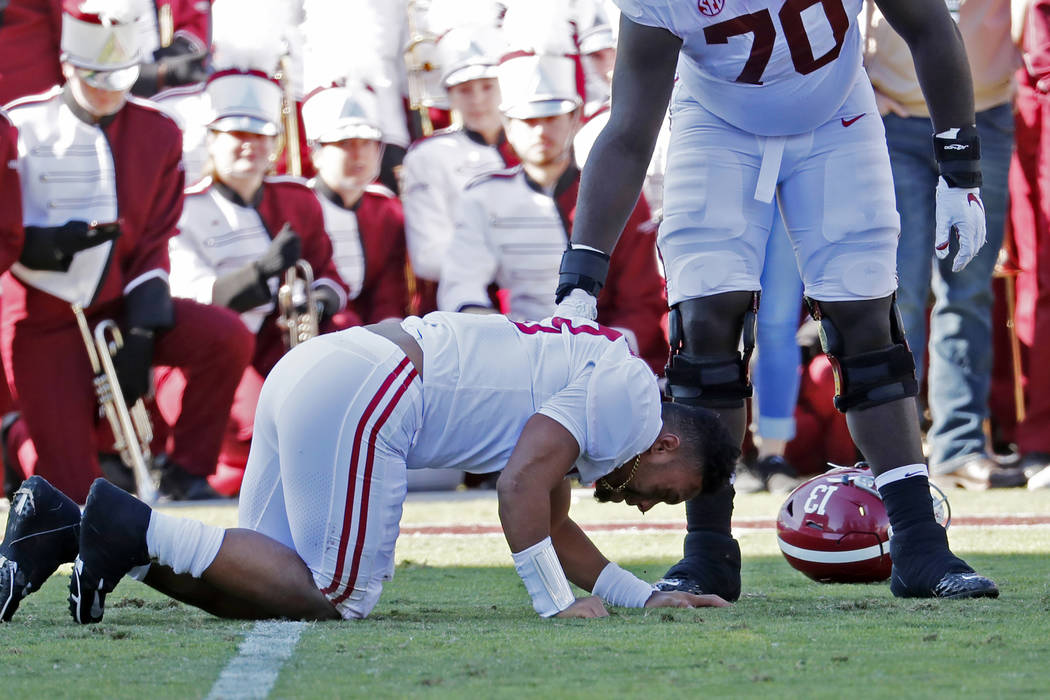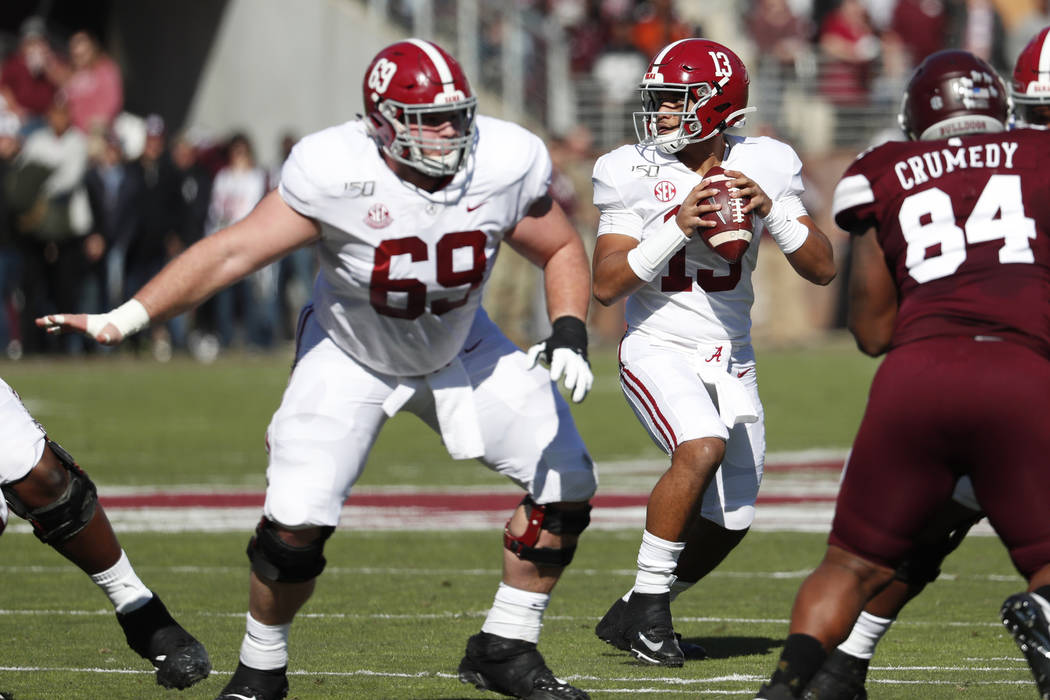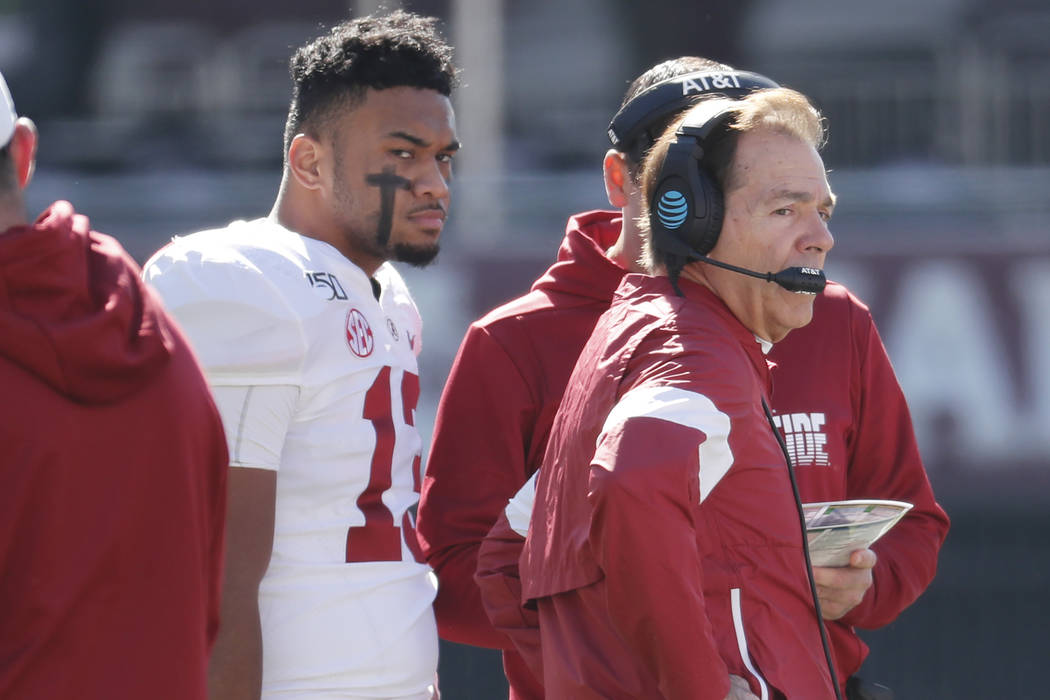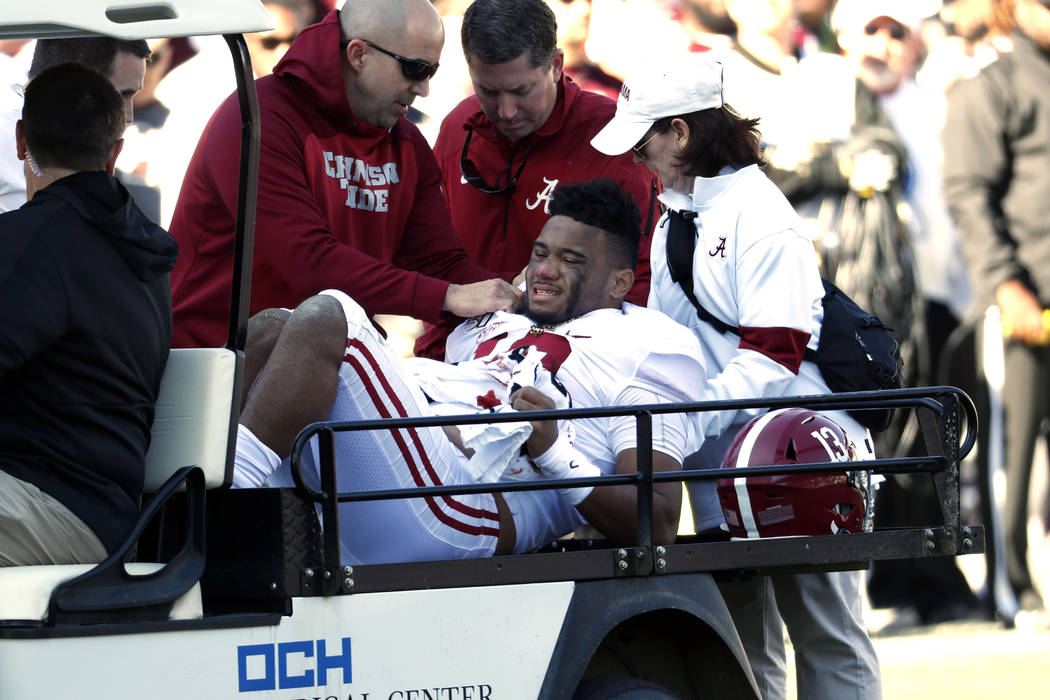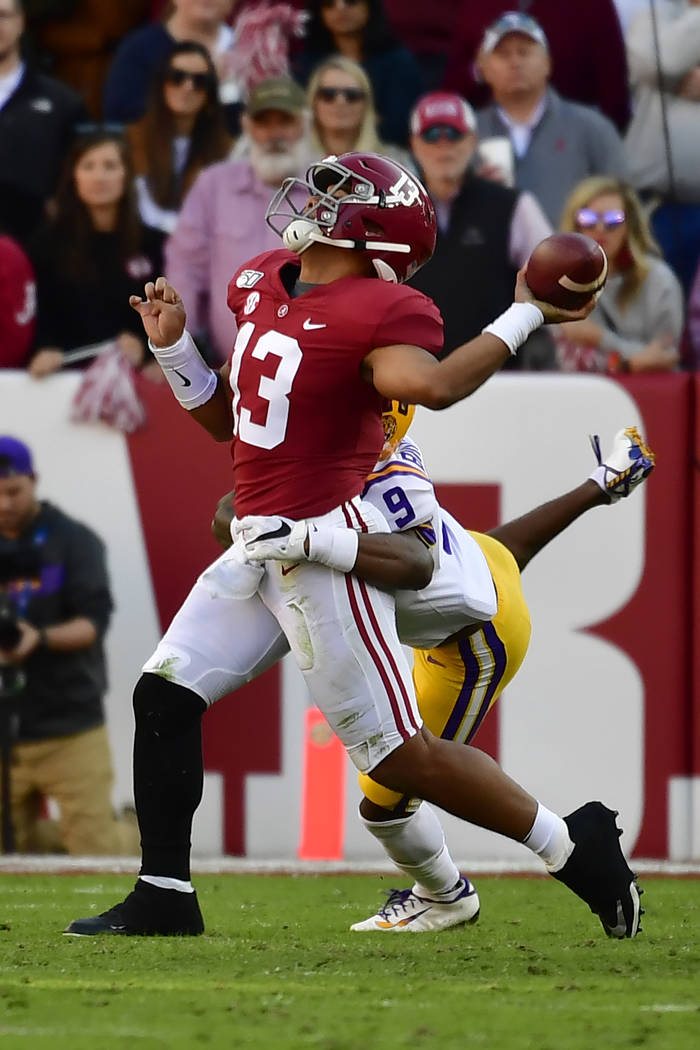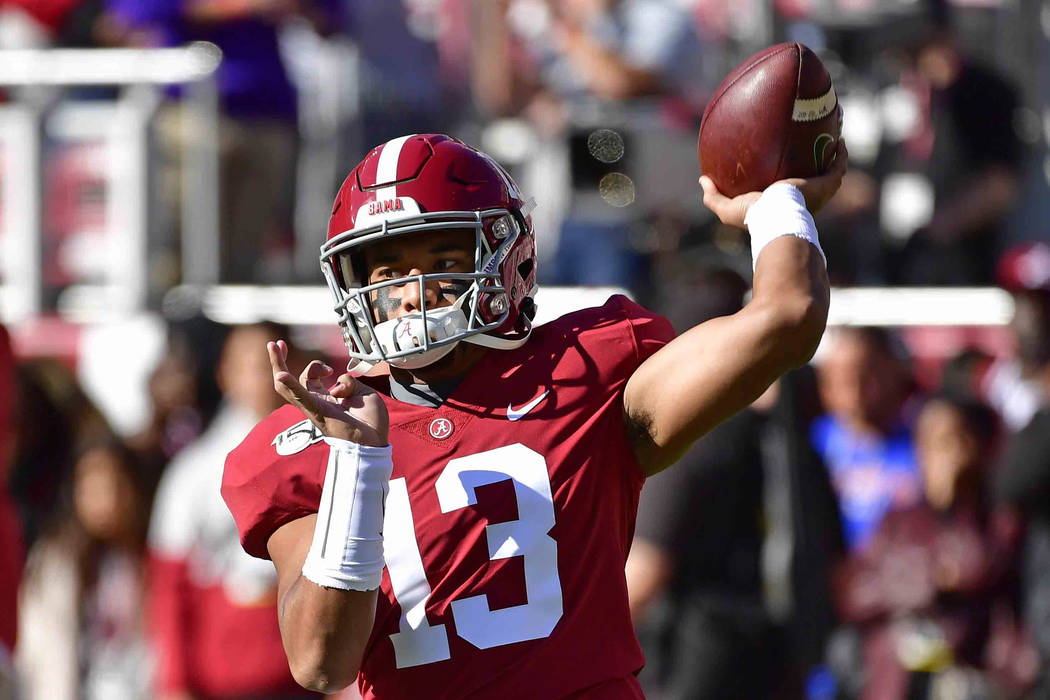Tua Tagovailoa’s NFL future could be affected by hip surgery
The quarterback landscape for the 2020 NFL offseason was already set to be one of the craziest in recent memory with names such as Tom Brady, Cam Newton (trade), Philip Rivers, Eli Manning, Jameis Winston, Marcus Mariota and Andy Dalton available to other teams.
Then the season-ending injury to Alabama quarterback Tua Tagovailoa put things further off-kilter.
Before the injury — a dislocated hip and, reportedly, a posterior wall fracture suffered against Mississippi State on Nov. 16 when the Crimson Tide was leading 35-7 — Tagovailoa was at least one of the top three quarterbacks available in the draft, along with Louisiana State’s Joe Burrow and Oregon’s Justin Herbert.
Five NFL executives polled by the Review-Journal said those three were clearly better than the next group (Jake Fromm, Georgia; Jacob Eason, Washington; Jordan Love, Utah State). Taking the injury out of the equation, three executives said Tagovailoa was their pick for the first quarterback taken over Burrow (two votes), despite the Tigers’ QB being the odds-on favorite to win the Heisman Trophy.
“Tua is the safer of the two,” one NFC general manager said. “Burrows really only has one year of high-level production, and those guys are dangerous. Tua has been doing it since he entered the national championship game against Clemson (in 2018). Plus, he comes out of a pro system. Sure, he’s small and there’s the durability stuff, but he’s a much easier projection than Burrows.
“Now, with this injury, that’s out the window.”
But a former NFL team doctor thinks that Tagovailoa’s draft stock should not be affected much.
“At the combine, teams will request a CAT scan to make sure the joint surface was not damaged and the fracture has healed, and an MRI will indicate whether or not there’s an issue with avascular necrosis, which is when the blood supply is disrupted to that area, which did in Bo Jackson,” said Dr. Thomas Gil, the director of the Boston Sports Medicine and Research Institute and former team doctor for the Patriots, Red Sox and Bruins. “If things look good in both those areas, even though he’s not totally out of the woods, I promise you someone will good ahead and move forward with him somewhere around the top 10. Especially teams that normally wouldn’t have a chance at a player like him.
“If he’s drafted any lower, then you know there’s a problem with the exams.”
While with the Patriots, linebacker Rosevelt Colvin suffered the same injury early in the 2003 season, and Colvin had the added detriment of having a loose piece of bone in his socket. Colvin went on to play five more season with the Patriots, including 67 consecutive regular-season and postseason games (winning two Super Bowls) immediately after his return from surgery.
“Linebacker is much more stressful on the hip than quarterback,” Gil said. “And it being Tua’s right hip, that’s more good news for him because it’s not his plant (left) side as a left-handed quarterback.”
Alabama team physician Lyle Cain described Tagovailoa’s prognosis as “excellent,” and multiple reports have set the time frame as three months to resume physical activity and six months to resume football activity. That means Tagovailoa probably couldn’t work out for teams until May.
The deadline for underclassmen to apply for the draft is Jan. 20. The scouting combine is Feb. 24 to March 2. The NFL draft begins April 23 in Las Vegas.
Will Tagovailoa declare for the draft? There are four possible outcomes, and each has its positives and negatives.
Option 1: Declare for the draft.
Pros: He starts the clock toward unrestricted free agency, where he’ll make the first real life-changing money of his career. If he’s taken in the first round, that’s after five years. If he slips into the second round, then it’s four years.
Cons: If Tagovailoa fell from, say, first overall to 15th because of the injury, he would stand to lose about $20 million in terms of total value, including $15 million in a signing bonus.
Option 2: Stay in school and play for Alabama.
Pros: If he gets healthy and is back in top form, then he would be in the mix for the first overall pick.
Cons: Many. He’d be in a much more competitive draft class with Clemson’s Trevor Lawrence and Ohio State’s Justin Fields, so there’s no guarantee he goes all that much higher. Plus, there’s the injury risk. If Tagovailoa, who is having his third surgery (two ankle surgeries), gets hurt again, his stock could drop significantly. And, finally, you’re delaying unrestricted free agency another year.
Option 3: Stay in school but don’t play for Alabama.
Pros: He’s guaranteed to be fully healthy.
Cons: The same as Option 2 without the injury risk. Plus, now you’re competing with players who have put film out there all season. Rust would be a big factor.
Option 4: Stay in school initially, but then declare for the supplemental draft.
Pros: He won’t have to be examined by team doctors or be pushed to work out before he is ready since the draft would be in July. Tagovailoa could be drafted higher by a team (still same draft order) that agrees to give up its 2021 first-round pick to select him. Money would be better, and his free agency would start as normal.
Cons: Tagovailoa would miss offseason workouts before training camp with his new team, so it might be tough to have a direct impact as a rookie.
To Andrew Brandt, a former Packers vice president and player agent, Tagovailoa’s best option seems clear.
“I think there’s very little chance he returns to school,” said Brandt, the executive director of Villanova’s Jeffrey S. Moorad Center for the Study of Sports Law. “As his agent, you have to get all the right medical reports out there because there’s nothing you can hide from the teams. It’s not like you’re going to fool them into drafting him.
“I don’t see how returning to school would help, aside from the education part of it. He won’t improve his draft stock that much. Teams are going to know whether he can play and the long-term issues. It makes sense from a business sense to start his career and that free agency clock as soon as possible, as long as there is no long-term damage.”
As for where Tagovailoa ultimately gets drafted, the five executives were split. As long as his long-term prognosis is good, one said top five, still. Three said 12th or higher. One said top 15.
Looks like the offseason of quarterback intrigue will get started a little early.
Greg A. Bedard covers the NFL for the Review-Journal. He can be reached at gbedard@reviewjournal.com. Follow @GregABedard on Twitter.



